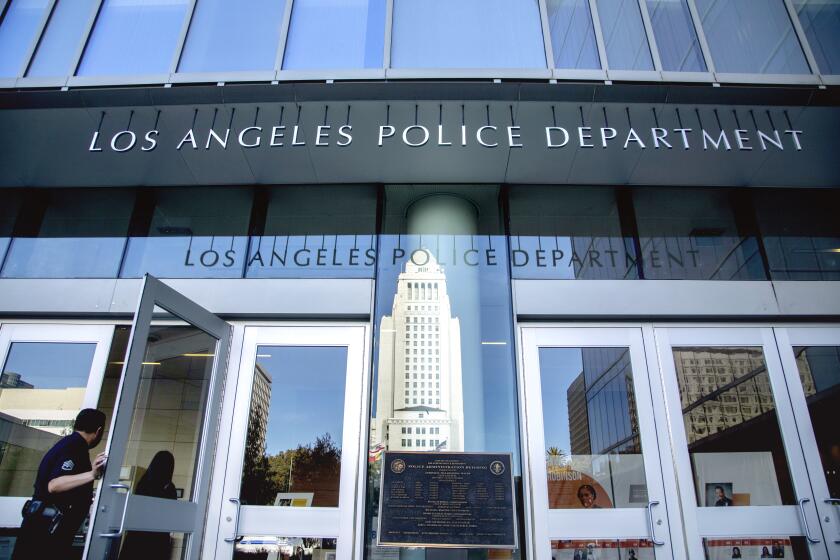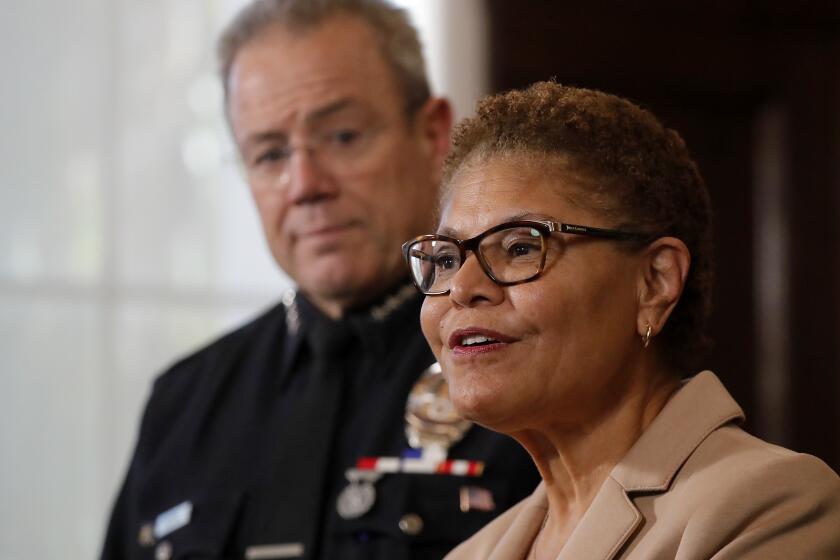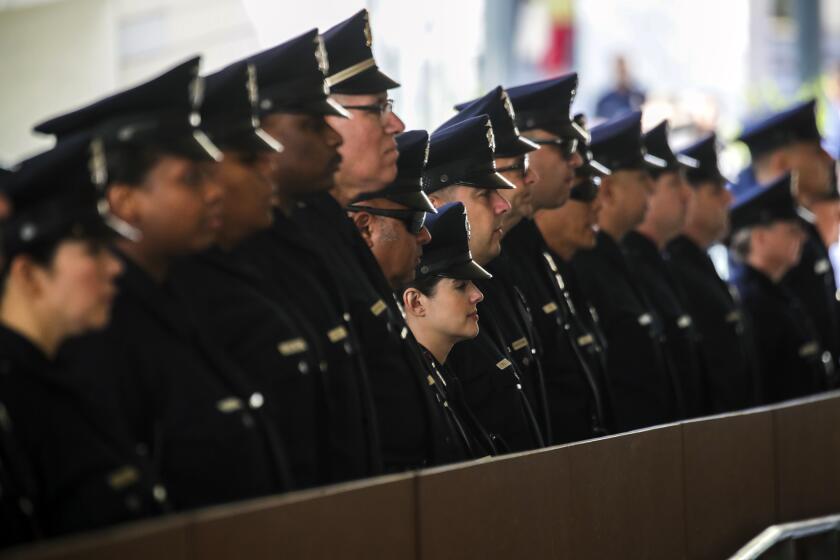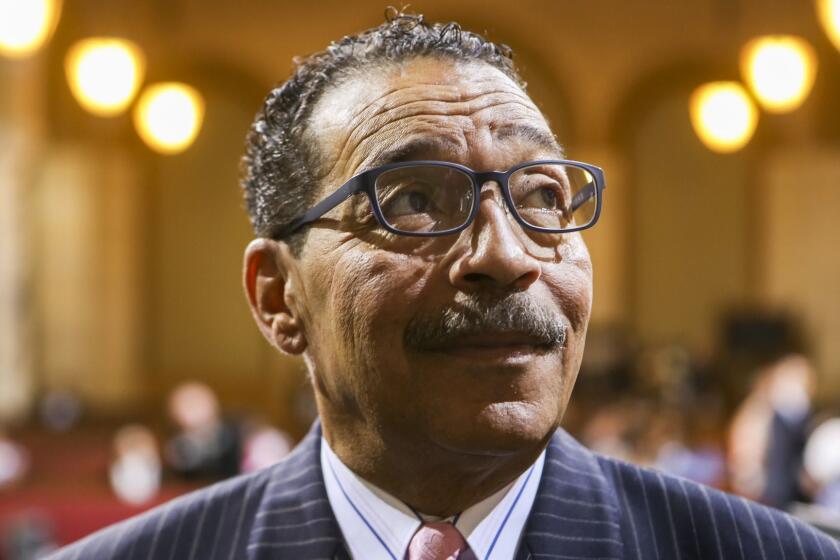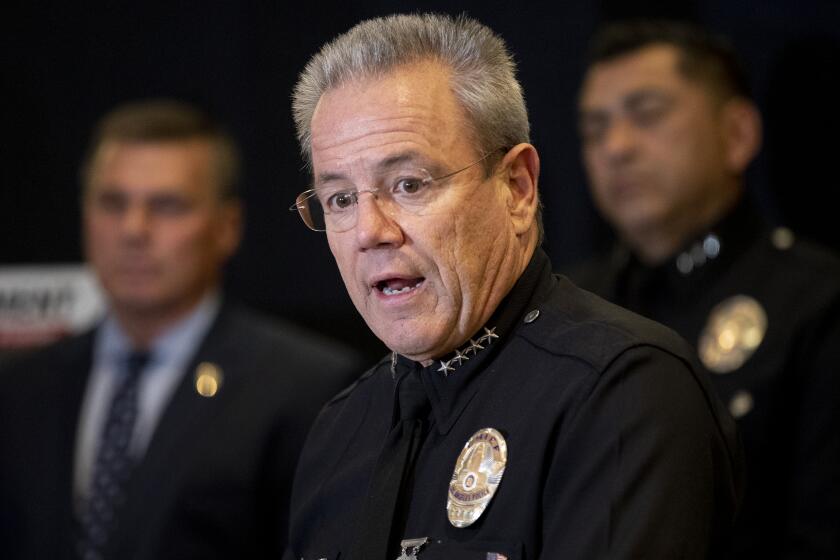The LAPD needs a better way to fire cops. So why are city leaders slow-walking reform?
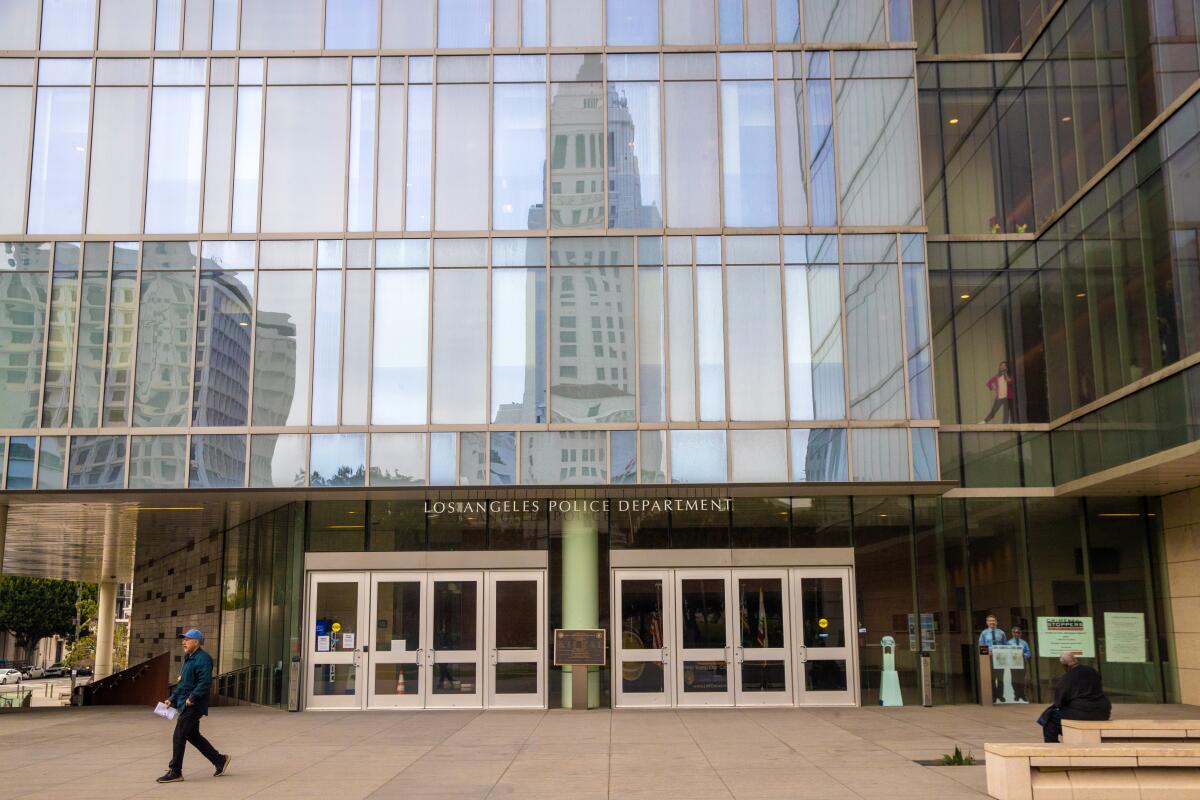
- Share via
If Los Angeles is going to improve its discipline process for police officer misconduct — as it should, so the chief can fire substandard officers — the City Council must get moving.
Voter approval is needed for any overhaul, and the council has just a few months to choose an alternative and craft language for the November ballot to undo the disastrous mistake it made several years ago.
Even in seemingly clear-cut cases of serious misconduct, the LAPD’s disciplinary system has led to outcomes in which those involved keep their jobs and continue collecting paychecks. Now, some leaders are renewing calls for a radical overhaul.
The council this week called for reports back from city departments on reform options, and that’s a good thing. But the council has been mulling reform suggestions for years, and has missed several opportunities to make improvements. It’s imperative that the council members quicken the pace and finally move a reform measure to the ballot.
The problem that it needs to fix is a 2017 ballot measure that undermines the police chief’s ability to fire an officer who lies, steals, dangerously misuses a weapon or engages in other egregious conduct.
Charter Amendment C, as it was called, likely fooled voters into believing they were toughening police discipline by permitting Boards of Rights to consist of three civilians, instead of just one civilian and two police officials. They may have figured civilians would be harder on cops accused of wrongdoing. But they had it backwards.
In her first few months as mayor, it seemed as if Karen Bass were a bystander when it came to the LAPD. But her actions and comments since show that she was in charge all along and deftly putting pieces in place for a change in leadership.
The results have been predictable. Officers accused of misconduct almost always choose all-civilian boards, which routinely thwart the chief’s attempt to fire them.
Officers who should have been shown the door remain in the department, drawing full pay and benefits. But they can’t be assigned to patrol, because they’ve been shown to be unreliable. They can’t take the witness stand because they’d have little credibility with jurors, so they can’t even field public complaints — because their reports could be challenged in court for having been handled by officers with records of dishonesty or other misconduct. The LAPD currently has about 70 personnel in limbo, pushing papers or doing other jobs that less-expensive civilian employees ought to be doing.
The LAPD’s Board of Rights hearings have long been the weak link in officer discipline. The City Council has another chance to fix the problem.
The Board of Rights is engrafted into the city charter, which can only be changed with the support of voters. What changes should the council ask them to make?
One option is to return to disciplinary panels made up of two police command staff members and a single civilian. But rank-and-file police officers believe higher-ranked officers too readily side with the chief, in order to win favor and advance their careers. Officers, just like the chief and the public, need a discipline system they believe is evenhanded.
Another possibility is changing the composition of the pool from which civilians are assigned to Boards of Rights, so that each board is more like a jury. The current pool is largely made up of lawyers and professional hearing officers who may tend to view accused officers as criminal defendants entitled to the same level of constitutional rights. Pool members who might be more skeptical of officers say they are often excluded from boards. Armed and sworn officers work in a chain of command, and although they deserve due process, they should be held to higher standards than accused criminals who could lose their liberty or lives, not just their badges.
After Los Angeles voters approved a ballot measure to remake a key part of the police disciplinary process, City Council President Herb Wesson promised a series of hearings around the city on LAPD reform and the kinds of complaints about policing that have riveted the nation’s attention over the last several years: Excessive force.
The council could also choose to beef up resources for the department’s advocates, who take the role of prosecutors in Board of Rights proceedings. They often find themselves outclassed by the first-rate defense lawyers the officers’ union hires to defend accused members.
City leaders could follow the lead of L.A. County, which permits the sheriff to fire deputies outright without seeking sign-off from a discipline panel. Fired deputies can appeal to a civil service commission to seek reinstatement. Observers differ on whether there is a meaningful difference between having the appeal come first, as the city does, or the firing.
Charter Amendment C, which voters approved Tuesday, undermines a key component of the Los Angeles police discipline system by granting officers an option to choose a historically more lenient group of judges when they’re accused of violating department policies.
Or it could do something even more sweeping, such as following the lead of other cities that have civilian review boards that conduct their own investigations, or combining the roles of L.A.’s Boards of Rights and Police Commission.
But we don’t think any of those options make sense. At this point, it seems unlikely that the council can identify the right discipline process on its own. Council members have been at it for decades, but all they have accomplished is weakening discipline when the public wanted them to strengthen it.
The best solution is for the council to put a measure on the November ballot that will take the Board of Rights language out of the charter altogether so that the police discipline system can be more regularly reviewed and updated without the expense of repeatedly sending voters something they don’t understand or that is meant to fool them.
The proposal comes from an unlikely duo at City Hall: Hugo Soto-Martinez, a self-described abolitionist, and Tim McOsker, a former police union lawyer.
The measure would create a panel of experts to review the process every five years or so, and to make recommendations for improvements based on best practices in law enforcement departments around the nation. The council would still have the final say over recommended changes such as the composition of the boards, the pools from which members are selected and who selects them. But instead of taking years to implement, updates would take place much more quickly.
Of course, quick is not the council’s forte. Mayor Karen Bass, City Atty. Hydee Feldstein Soto and some council members have said they want to undo Measure C. That’s a hopeful sign. City leaders risk ratifying the 2017 mistake for at least another two years if they don’t do the work to get something together for the November ballot.
Updates
11:11 a.m. March 21, 2024: This editorial was updated to reflect a vote by the L.A. City Council to pass a motion asking for police discipline reform options.
A cure for the common opinion
Get thought-provoking perspectives with our weekly newsletter.
You may occasionally receive promotional content from the Los Angeles Times.
